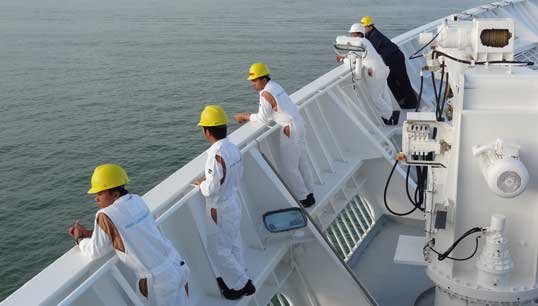Unions and employers step up joint campaign for seafarer key worker status
23 April 2021

With the crew change crisis still not resolved and vaccinations inaccessible to many, it is more important than ever for seafarers to be recognised as key workers during the Covid-19 pandemic.
This was the message to national governments throughout the world in a 20 April joint statement from the European Transport Workers' Federation (ETF) and the European Community Shipowners' Associations (ECSA).
As European Social Partners, the two bodies have already been working together for several months on the effort to achieve key worker status for seafarers – 'to ensure their travel is facilitated, thereby making crew changes, repatriations and medical assistance possible.'
Now that vaccinations are being rolled out, the partners also want to see maritime professionals – as key workers – moved into the priority groups for the coronavirus jab, in view of their importance to keeping global trade moving.
ETF and ECSA acknowledge in their statement that there is no single agreed definition of what 'key worker' means, so they provide a list of rights that should be applied to seafarers during the pandemic – drawing on the universal rights set out in the Maritime Labour Convention, 2006.
This list of pandemic rights for seafarers is as follows:
1. Travel
MS [Member States] should ensure that seafarers can travel to and from their country of domicile and their place of work without restriction, and can move freely between regions and states of applicable countries.
MS should work together to ensure that IMO Protocols for ensuring safe ship crew changes and travel are implemented.
MS should ratify and implement ILO C185 - Seafarers' Identity Documents Convention.
MS should, in the case of their embassy, consulate or high commission being closed in a seafarer’s country of residence, make provisions for any required visas to be issued upon arrival.
2. Quarantine
MS should exempt seafarers from quarantine upon arrival in the jurisdiction in which they will sign on to their vessel.
3. Medical treatment
MS should ensure that procedures are in place that accord with the International Chamber of Shipping Guidance for Ship Operators for the Protection of the Health of Seafarers.
4. Testing
MS should prioritise seafarers for Covid-19 testing, particularly where test results are required in advance of a seafarer joining their vessel.
MS should prioritise seafarers for Covid-19 testing where necessary in jurisdictions visited by the seafarer and assist industry in providing access to onboard Covid-19 testing.
5. Welfare
MS should ensure that seafarers are able to access welfare facilities ashore, or that welfare organisations can safely approach vessels at the dockside, via tender or – where appropriate safety measures are in place – that welfare providers can board vessels.
6. Vaccination
MS, in planning for vaccination programmes in their own jurisdictions, should ensure that seafarers can access vaccinations as a priority, in order to further facilitate the easing of restrictions currently faced.
MS, working with shipowners and trade unions, should plan for seafarers currently at sea to be able to access Covid-19 vaccinations as early as possible.
7. Financial support
MS should ensure that seafarers resident in their territories who are unable to access employment due to cessations or reductions of activity, a lack of available transport, closed borders or other crew change difficulties resulting from the pandemic, can access schemes of financial support that are available to their residents who are engaged in other professions.
Tags
